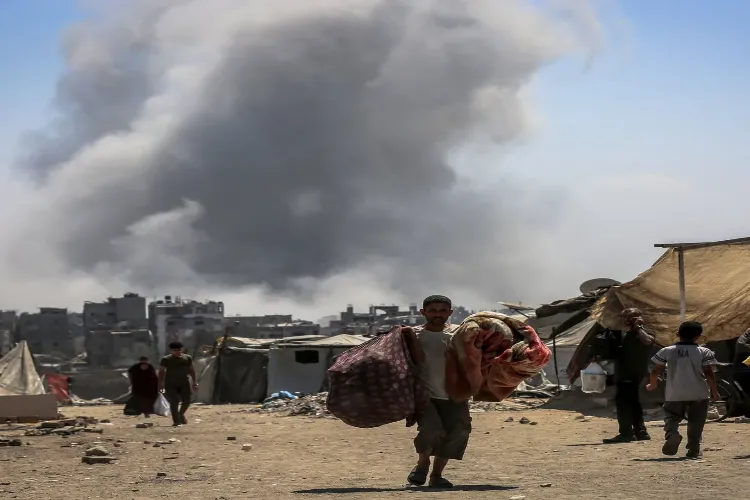
Deir Al-Balah (Gaza City)
When Israeli bombs began falling, Mohammad al-Najjar, his wife and six children fled their house in southern Gaza in the dead of night, dispersing in terror alongside hundreds of others from their neighbourhood.
When the dust settled and al-Najjar huddled with his family in a shelter miles away, his son Ahmad, 23, was missing. After daybreak, the family searched in nearby hospitals and asked neighbours if they had seen him.
There was no trace. Nearly two years later, they are still looking.
“It is as if the earth has swallowed him,” said Mohammad al-Najjar. He spoke from the family's tent in Muwasi, along Gaza's southern coast, their ninth displacement camp since that fateful night in December 2023.
Thousands in Gaza are looking for relatives who have gone missing in one of the most destructive wars of the past decades. Some are buried under destroyed buildings. Others, like al-Najjar's son, simply disappeared during Israeli military operations.
In a war where the true number of the dead is unknown, “what the accurate number (of missing persons) is, nobody knows," said Kathryne Bomberger, director general of the International Commission on Missing Persons.
The al-Najjar family has searched through the rubble of their bombed-out home. They went to the morgues and checked with the International Committee for the Red Cross.
“Is he a prisoner (in Israel), is he dead?” the 46-year-old father said. “We are lost. We are tormented by everything.”
The Israeli Prison Services and the military said they could not release identifying details about specific prisoners and refused to comment on al-Najjar's status.
An enormous task
Some 6,000 people have been reported by relatives to still be buried under rubble, according to the Health Ministry. The true number is likely thousands higher because in some cases entire families were killed in a single bombing, leaving no one to report the missing, said Zaher al-Wahidi, the ministry official in charge of data.
Separately, the ministry received reports from families of some 3,600 others missing, al-Wahidi said, their fate unknown. So far, it has only investigated over 200 cases. Of them, seven were found detained by Israel. The others were not among those known to be dead or buried under rubble.
The ministry is part of the Hamas-run government. The UN and many independent experts consider its figures to be reliable.
The ICRC has its own separate list of missing — at least 7,000 cases still unresolved, not including those believed to be under rubble, said chief spokesman Christian Cardon.
There have been many ways to disappear during the chaos of offensives, strikes on buildings and mass displacements of almost all of Gaza's 2.3 million people. Hundreds have been detained at Israeli checkpoints or were rounded up in raids with no notification to their families.
During Israeli ground assaults, bodies have been left in the streets. Palestinians have been shot when they came too close to Israeli military zones and their bodies are found weeks or months later, decomposed.
The Israeli military has taken an unknown number of bodies, saying it is searching for Israeli hostages or Palestinians it identifies as militants. It has returned several hundred corpses with no identification to Gaza, where they were buried in anonymous mass graves.
Investigating the missing requires advanced DNA technology, samples from families and unidentified bodies, and aerial imagery to locate burial sites and mass graves, said Bomberger. “It is such an enormous undertaking,” she said.
But Israel has restricted DNA-testing supplies from entering Gaza, according to Bomberger and the Gaza Health Ministry. Israeli military authorities would not immediately comment when asked if they were banned.
Bomberger said it is the state's responsibility to find missing persons — in this case, Israel, as the occupying power. “So it would depend on the political will of the Israeli authorities to want to do something about it.”
Scent of her son
Fadwa al-Ghalban has had no word about her 27-year-old son Mosaab since July, when he went to get food from their family house, believing Israeli troops had already left the area near the southern town of Maan.
His cousins nearby saw Mosaab lying on the ground. They shouted his name, but he didn't answer, and with Israeli troops nearby, it was too unsafe to approach him, and they left. They presumed he was dead.
Returning later, family members found no body, only his slippers.
ALSO READ: Scientist Shams Pervez keeps a hawk's eye on Raipur's air quality
Her family has put up notices on social media, hoping someone saw Mosaab in Israeli detention or buried him after finding his body.
